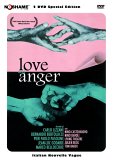| Reviews & Columns |
|
Reviews DVD TV on DVD Blu-ray 4K UHD International DVDs In Theaters Reviews by Studio Video Games Features Collector Series DVDs Easter Egg Database Interviews DVD Talk Radio Feature Articles Columns Anime Talk DVD Savant Horror DVDs The M.O.D. Squad Art House HD Talk Silent DVD
|
DVD Talk Forum |
|
|
| Resources |
|
DVD Price Search Customer Service #'s RCE Info Links |
|
Columns
|
|
|
Love and Anger
For those unfamiliar with Love and Anger this is a rather biased experimental project by five classic European directors well known for their political views- Marco Bellocchio, Bernardo Bertolucci, Jean-Luc Godard, Carlo Lizzani, and Pier Paolo Pasolini. As you could guess each director contributed with a short story that at least in my opinion does not shy away from professing a passionate support for the cause of the progressive political forces a.k.a the (far) left. Or so it seems from the honest political statements each director has snuck in. The surprising element here is that supposedly they are all based on texts from the Bible and transported into a modern-day setting.
L'Indifferenza is a story about a woman being raped in a risky part of the city while a man on the opposite side of town is desperately attempting to rescue the life of his wife which has suffered a serious car accident. Unfortunately neither the rape victim nor the man and his badly injured wife manage to receive any help that would have prevented the two tragedies from happening. On the contrary they are faced with cold indifference from those that actually witness their suffering and are purposefully ignored.
Agonia, the second story in this collection of films, tells the story of a dying man who is exposed to some sort of spiritual ritual recreating the true agony the human soul is bound to experience before it leaves the body. Directed by Bernardo Bertolucci this particular segment is truly the one that will test your tolerance for experimental moviemaking. Almost entirely devoid of any dialog yet filled with never-ending moaning and groaning "recreating" the agony process Agonia goes a bit too far even for my taste. Nevertheless fans of the Maestro would like to give it a shot if for nothing else at least for the sake of testing a side of Bertolucci which appears rather unusual to say the least-his fascination with abstract cinema.
La sequenza del fiore di carta, the third installment in this collection, follows a young Italian man through the streets of Rome while many are staging an anti-war protest. Clearly the most dated of the five stories La sequenza del fiore di carta is also the most likeable one. There is something attractive in seeing genuine war-protest scenes from the 1960s that would seem quite familiar to many that followed the turbulent events in America from the last couple of years (the riots in Seattle, Washington DC, etc). A curious if not too familiar take on a part of Italian history that many still debate with a passion.
L'Amore, the fourth installment in the collection, is directed by Jean-Luc Godard and follows the discussion between a man and a woman observing a couple in love. The man speaks Italian while the woman speaks French. While well-put together and with some interesting "observations" L'Amore might well be one of Godard's too quick yet too pretentious attempts in experimental filmmaking. Furthermore there are some very familiar stylistic Godrard-esque elements…a provocative statement countered with a more provocative answer, an edgy comment replied to with a philosophical remark, etc. The core of this short story however remains clearly structured upon Godard's famous fascination with Karl Marx and his revolutionary theories.
Discutiamo, discutiamo is the fifth and final installment in Love and Anger. Somewhat thematically linked to the ideals shared by Godard Discutiamo, discutiamo walks us into the classroom of a professor and his students where bold politically-charged statements are being made. Once again inspired by Marx and his revolutionary philosophy this is a short film that hardly brings any closure to the collection yet it reaffirms my conviction that it is nothing more than an attempt to explore the uneasy political climate of the 1960s.
So what are the redeeming values of Love and Anger? The easiest and safest answer would be that as long as you understand that these are all experimental short features that should not be taken with the degree of seriousness one should address the full-length films of Bertolucci, Godard, Bellocchio, Pasolini, and Lizzani Love and Anger actually delivers a good feel of what film directors in Europe wanted to concentrate on at the time-bold, provocative, at times brash political pictures that were meant to reinvigorate the social consciousness of its viewers. Whether or not they managed to do so with their work I leave for you to decide. At least for me the answer is obvious.
How Does the DVD Look? How Does the DVD Sound? Extras: Final Thoughts:
|
| Popular Reviews |
| Sponsored Links |
|
|
| Sponsored Links |
|
|
| Release List | Reviews | Shop | Newsletter | Forum | DVD Giveaways | Blu-Ray | Advertise |
|
Copyright 2024 DVDTalk.com All Rights Reserved. Legal Info, Privacy Policy, Terms of Use,
Manage Preferences,
Your Privacy Choices | |||||||












